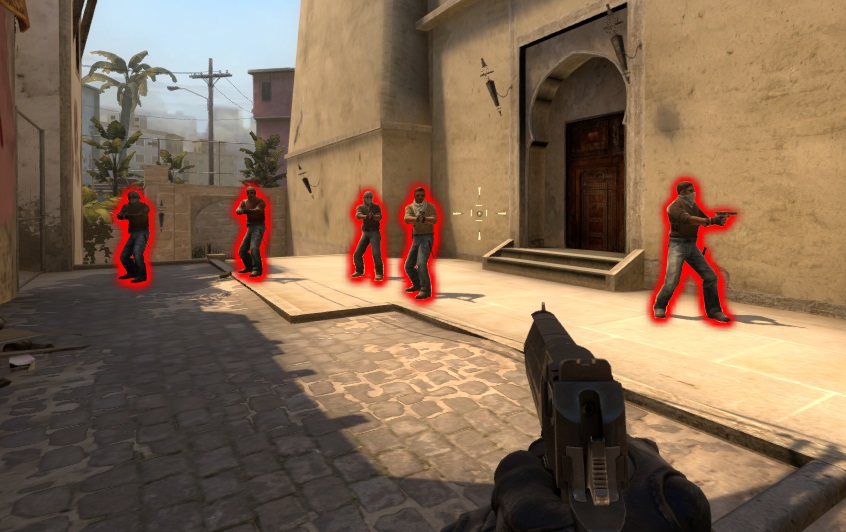“Hacking” might be a scary word to some people, especially when it comes to multiplayer gaming, but the word itself has a broad definition. There are those who “hack” in order to preserve old video games and software that can’t be played anymore, creating emulators from scratch so that nostalgia can still be a thing to be called upon later on in life. In truth, the people who build emulators and distribute ROMs—backups of older software—have attained an almost martyr-like status among the video game community.
Then there is cheating. As many fans of multiplayer first-person shooters will be able to tell you, cheating is that one weed in a garden of roses that keeps popping back up no matter how many times developers try to cut it away. Wall-hacks, speed boosters and aim-bots plague games like Apex Legends, Fortnite and Overwatch, ruining the fun of everyone involved. The issue isn’t limited to regular players either. It was only a few months back that PUBG banned around 30k cheaters, with pro players being part of that ban wave. When even your pro players cheat to get ahead of the game against more casual players, it calls into question the reason for cheating.
What about cheating is so appealing in the first place? Was it the faux-strength that came with dominating other players, or was it something else entirely? After all, surely it couldn’t be called an accomplishment to win over other players while having an unfair advantage.
It was a conundrum that I was determined to solve.

Credit: Valve / Unknowncheats.me
But as more hackers are facing arrest and indictment, such as what happened to several Chinese Dota 2 cheaters in September, finding those willing to talk about why they do what they do was hard. Harder still was finding those who, after initial talks, didn’t block me from contact almost immediately afterwards. Despite the promise of anonymity, none seemed willing to discuss their motivations.
However, one individual I met in a cheating community on Discord, who we’ll call “Dominic,” responded to my questions with a surprising amount of candor. Well, as much candor as a voice through a filter can allow. After a few text messages on Discord, Dominic told me that he would be open to talking to me as long as he was granted anonymity and would be able to talk through using a voice modulator that affected his voice. It seemed odd, but this whole situation seemed odd so I allowed it. The demands didn’t stop there either. I wasn’t allowed to contact him by any other means but Discord, and while he didn’t mind ‘personal’ questions, he would prefer I didn’t go overboard. To me it felt as though I was signing a contract of some sort, but with Dominic being one of my only leads on this subject, I felt I had little choice but to agree.
And so our conversation began. During the beginning of our talks, Dominic clarified to me that he currently wasn’t making cheats, but was certainly buying them. He refused to give me a specific website where he got his cheats, but said that cheating was easy to find on social media, particularly Instagram and Discord. After searching myself, it did seem as though it was easy to find the cheats I would need, hidden between almost innocent terms like “hackhelp” and “helpfulhacks.” I found it interesting that Instagram, a site that relies on images for content, was the site where hacking seemed to be most rampant. With Discord, it is just as simple but surprising how putting in ‘Discord community video game hacking’ in Google can reward me with a numerous list of people to ask for cheats. Of course, whether their legit or not is also part of the question. I’d often find clicking on the links in Discord would lead to me clickbin websites, where my credit card would be asked for. Yeah, no.
Credit card scammers aside, Dominic told me that PayPal was the easiest way to pay. After all, you could easily lie about what you were selling and buying. From my personal experience of having done art commissions, I knew that wasn’t a lie. It is easy to buy things, and as much as PayPal may try, it ultimately has a laissez-faire attitude and places a lot of trust in its customers.
When I asked Dominic why he bought cheats, he said, “It’s simple really: It makes me laugh, especially in CS:GO,” referring to the Valve shooter Counter-Strike: Global Offensive. “Of course, it can get annoying and boring if someone uses them for no reason. For example, I cheat when others start to cheat. It’s like a defensive technique which sometimes works out, sometimes doesn’t.”
As for who got him into this world of cheating, the answer hit closer to home than I expected.
“My brother introduced me to it,” Dominic said. “He always used to beat me, no matter how hard I tried. It got to the point I stopped playing with him, but after a while I just got curious and wanted to know how to get better. Turns out ‘better’ was actually just using cheats.”
Dominic then offered to screen-share his game of CS:GO, but said he’d need to purposely blur it to remain anonymous. I agreed to his terms. As he played, I was mesmerized by the slaughter his hacks produced. With a few clicks of the mouse, Dominic could see through walls, fire his weapons with zero recoil, and land each shot regardless of how erratically the enemy was moving.
While I had never played a single game of CS:GO prior to watching, it was clear just how much Dominic could twist and turn the game to his liking. If the players who were up against him were having any fun, being killed brutally and repeatedly, then they had much more patience than I would in their place.
As he played, Dominic further explained that, after he’d been cheating for a while, he reached out to his friends and helped them cheat, too, continuing the cycle. When they played together, he enjoyed being an unstoppable force. He even was thinking of making his own cheats to sell, saying that he was “the right age to sell this stuff without facing jail time.”
When I asked whether he was younger than the 17-year-old hacker that had been interviewed by the BBC in September, Dominic refused to give a solid answer. The evasion probably said just as much as a straight answer would have.
Throughout our conversation, Dominic had been almost amiable, but his tone shifted the moment I asked him if he considered the thoughts and feelings of those who he cheated against.
“Well, they can just quit the game. It’s not hard to do that,” he said. When I pointed out that cheating and hacking had become so prominent in some games, such as PUBG and CS:GO, that leaving didn’t really seem like much of a solution, Dominic’s attitude changed. He accused me of trying to paint him as “the bad guy” and left our call. Despite apologizing, Dominic ended up blocking me on Discord and, soon after our conversation, I found the Discord server I’d been a part of with Dominic had also kicked me out. This came as no surprise to me, as I’d been poking around that server looking for other people willing to talk to me. I’d even come across one girl who had been using the server to try and investigate scamming. We were definitely not the “usual” clientele.
Despite what looked to be a deadend, I still wanted to find out what drove players—especially younger players—to eventually make a career out of their hacks. Jack Rhysider, host of the podcast Darknet Diaries, specializes in retelling stories about the darkest side of the internet. After reaching out to Rhysider through Twitter, he told me he had no stories that relate to wall-hacking and the like, but did have a general idea on why hackers do what they do—even when those things are illegal.
“I do think a lot of people get started as gamers,” Rhysider said. “If you think about it, if you are a teenager and use computers as your hobby, gaming even, and you have a computer in your bedroom as a teenager, you start thinking of ways to get an advantage in the game. Maybe this little tweak or cheat. And you start learning about how the game works, and that grows to how software works. And that grows to how computers work.
“Combine a curiosity for computers, with a passion for sitting in front of them for endless time, with the luxury of being able to have one in your bedroom to use whenever you want. Yeah, a hacker can easily come out of that situation.”

that are nearly impossible to find elsewhere.
That model, fittingly enough, matched the story of another hacker I talked to, Nick Jones. Jones, who preferred to be credited under an alias rather than his real name, doesn’t involve himself with more sordid hacks for multiplayer games, but instead uses his knowledge to create ROMs and emulators.
I talked to Jones on the recommendation of a friend who used ROMs, who got permission to add me to a secret Facebook group Jones runs for emulation enthusiasts. It was there that I finally got to speak to Jones about his past, particularly how he ended up getting into creating ROMs.
“My dad bought a Commodore VIC-20 in 1982 when I was 4 years old,” he said. “I was fascinated by it and taught myself how to use BASIC to write very simple programs before I was even in kindergarten. From there it just became an interest of mine, I spent most of my childhood in the ’80s and ’90s tinkering with our home computer and whatever game consoles I had. I was always interested in trying to get the computer to run better or run software it shouldn’t have been able to run.” Jones recalled getting Duke Nukem 3D up and running on a machine with an Intel i486SX-20 processor, a chip less than half as fast the game’s minimum requirement. “It ran very badly, but it ran.”
What started as simple hobby focused on preservation and upgrades soon took a darker turn. Eventually, Jones’ interests shifted to illegal activities like cracking, phreaking, and carding.
“To say I broke a few laws as a teen would be a gross understatement,” Jones said. “As far as computer crime went, the ’90s were like the Wild West. It was wide open and lawless because it was nearly impossible to actually get prosecuted because local authorities didn’t understand how to handle an electronic crime someone across the country had done.”
Jones told me that he would make phone calls that the company would charge to a random number instead of his own account. He also generated fake credit card numbers and used them to order stuff online, using a nearby abandoned house as the shipping address. By the time the bank would figure it out and alert the retailer, the shipment would already be on the way.
What started as an innocent hobby eventually led to Jones’ arrest—twice. He beat the felony charges both times, but he nevertheless assured me that it was a thing of the past. “It is not at all something I’d do today. Today the law is much more clear and law enforcement much better trained and equipped to handle that sort of thing. The stuff I did in the ’90s was fun and games; today, it’s a 20 year prison term for fraud and identity theft.”
Jones said that he learned his lesson 12 years ago after he was arrested for a second time. Nowadays, all he does is “stuff like jailbreak video game systems or adding free streaming apps to Fire stick.” Of course, as Jones himself admits, his case was rather extreme. He said not many of the people in his Facebook group have even come close to committing the sort of crimes he had.
Listening to Jones’ story after talking to Dominic, it would be easy to say that they’re quite different. After all, cheating and hacking, as similar as they are, aren’t quite the same thing. Their stories, the motivation behind the life they have led so far, and where it will lead them isn’t as clear cut as what I was looking for.
For Jones, hacking led to a change in his life. As for Dominic, I’m unsure of what his future will be, but can only hope that if he does decide to change, it’s not due to the same things that occured to Jones. And yet, the answer of why someone would be pushed to commit acts that bleeds people of their money, as well as cause tremendous hassle and pain for developers and communities, still remains a mystery. Perhaps because in truth, there is really no definitive answer at all.
Header image by Faiq Al-Az.

Aimee Hart is the Deputy Editor of Gayming Magazine and specializes in video games, tabletop, anime and trying her best.